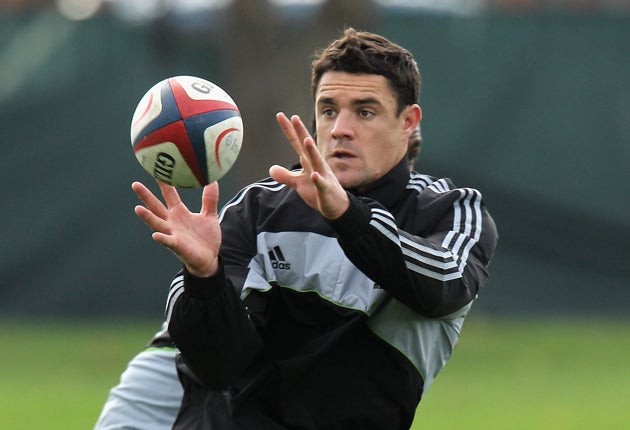Brian Ashton: All Blacks show how to nurture smarter players
Tackling the issues

Some of the rugby I've seen played in the British Isles of late, including major international contests, has set me thinking anew about what I consider to be one of the burning topics in the modern game: the relationship between coaches and players, both before a match and during it.
The arrival of the All Blacks in London is another reason to revisit the subject, because under their current coaches – Graham Henry, Steve Hansen and Wayne Smith – they seem to be ahead of the field in striking the correct balance.
When the sport first went professional, I remember one Test player saying that, as he was now an employee, it was his job to do as his coach told him. I found it as exasperating then as I do now, for I have long held the view that this is not true; that in a game as complex as rugby, it is for the coach and the players to work through things together. Surely we are not seriously suggesting that a coach is the fountain of all knowledge, that he alone can sense the changing dynamic of a match from a seat in a stand perhaps 50 yards away from the action.
Too often, I hear people talk disparagingly of a coach who has encouraged his players to become fully engaged with the decision-making process, as though his authority, perhaps even his competence, is somehow diminished by it. Actually, this engagement is precisely what should happen, because the interactive environment – the two-way street – is crucial to success. Certainly, I'm suspicious of any player who is happiest when simply obeying instructions.
I was fortunate enough to coach at Bath during the club's unparalleled spell of achievement in the last decade of the amateur era and I cannot imagine we'd have been anywhere near as strong had the players not involved themselves in every aspect of our development. There were some extremely talented, strong-minded individuals at the Recreation Ground in those days: Stuart Barnes, John Hall, Jeremy Guscott...rugby followers of a certain age will know the names. If the coaches introduced the concepts, it was they who insisted on applying the detail.
What was more, they constantly challenged us to come up with something different as a way of keeping the training sessions fresh. As a consequence, it was an extraordinarily invigorating environment for all of us.
Of course, there comes a time when a head coach has to show his dictatorial side, to lay down the law. I dare say Henry has his moments in this regard, just like anyone else charged with running an international team under a great weight of expectation from the sporting public. But this is the same Henry who is happy to describe Daniel Carter, the All Blacks' magnificent outside-half, as his "coach on the field". I cannot imagine for a second that players as accomplished and intelligent as Carter, Richie McCaw and Conrad Smith, to name but three, do not play a prominent role in identifying the optimum approach to winning.
As I've said before, I'm intrigued by the decision of the three coaches to switch responsibilities ahead of this tour. By their own admission, the All Blacks are not at the very height of their powers just now, but instead of retreating into themselves, Henry and his colleagues have chosen this moment to try something a little different. It proves to me once again that, above and beyond almost everything else, the New Zealanders are great students of the sport, endlessly fascinated by its possibilities.
In August, I travelled across the Atlantic to take part in a course aimed at raising the standards of coaches in the United States. Among the people involved were four of the great All Blacks of the modern era: the hooker Sean Fitzpatrick, the No 8 Murray Mexted, the outside-half Grant Fox and the full-back Christian Cullen. Not a bad quartet. Yet each and every one of them was as open to ideas as he was to put forward thoughts of his own. Sean told me that to reach each stage of his international career – to win the shirt in the first place, to hold on to it in the face of intense opposition and, finally, to secure the captaincy – he had to raise his learning to a new level.
A player like Fitzpatrick did not achieve what he did by simply following a diagram drawn for him by his coach. He was what educationalists call an "involved learner", as opposed to a "dependent learner". My fear is that professional rugby is producing too many people in the latter category and not enough in the former – that the coach-player relationship has been widely misunderstood, to the detriment of the sport as a whole.
Freestyle Aussies are unplayable
I often talk about rugby players having to think on their feet. Last week, the Australian rugby league team illustrated the point by conducting a masterclass in performing at the highest level in a pressurised environment – and in weather conditions a long way short of ideal.
In their big match against England, they scored six tries in the final 25 minutes after being thoroughly tested in the previous 55. My point is that these tries could not, by any stretch of the imagination, have come from moves rehearsed on the training field.
Instead, they were the products of the players' highly developed instinctive ability to appraise a situation and capitalise on it. If such moves are unplanned by the attacking team, this much is obvious: it's one hell of a job to defend against them.
Subscribe to Independent Premium to bookmark this article
Want to bookmark your favourite articles and stories to read or reference later? Start your Independent Premium subscription today.

Join our commenting forum
Join thought-provoking conversations, follow other Independent readers and see their replies